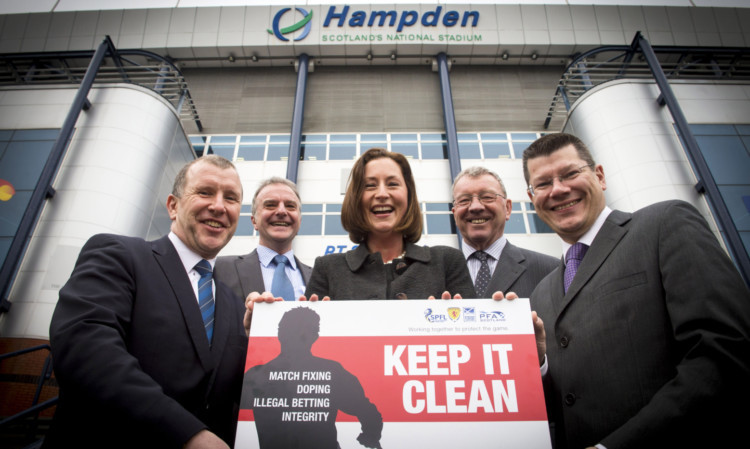The Scottish Football Association has launched an anonymous hotline to help prevent match-fixing and other corruption within the game.
The 24-hour telephone line will be operated by Crimestoppers and allows footballers and other club officials to report activity such as match-fixing, illegal betting and doping.
The Keep It Clean campaign, which was conceived and launched in conjunction with the Scottish Professional Football League and the players’ and manager’s unions, will be relayed to clubs via an awareness pack while the SFA has appointed a security and integrity officer, Peter McLaughlin, who is a former police superintendent.
The scheme was in the pipeline before a number of players were arrested last month over spot-fixing claims, including former Hibernian striker Akpo Sodje, who is now with Tranmere. And SFA chief executive Stewart Regan believes the project is about prevention rather than cure.
Regan said: “You can never be complacent in anything that involves match-fixing. Football relies on everyone involved in it being honest, transparent up-front and anything that jeopardies that has to be dealt with.
“Let’s be clear, there is no evidence to suggest there is any match-fixing or corruption of any kind taking place in Scottish football. This is about prevention and making sure we work together to minimise the threat of activity we know is happening elsewhere in the world, happening in Scotland.
“We don’t want anyone involved in Scottish football to be threatened or intimidated in such a way they are pressurised to throw a match. This is about prevention rather than cure at this stage.
“There is certainly more evidence emerging from around the world that match-fixing and other challenges to integrity are starting to gain a hold in certain parts of the world. We are keen to work with all football authorities to make sure it doesn’t come to our shores.”
PFA Scotland chief executive Fraser Wishart stressed that players in other parts of the world were often pressured into corruption.
The players’ union boss said: “We have seen a wave come from the east, from Asia through Eastern Europe. FIFPro (the world players’ union) has got a black book which it gave to the European Commission about a year and a half ago where it had surveyed players in Asia, South America and Eastern Europe and some of the horror stories about the way they are treated – intimidation, violence and forced into match-fixing. It was horrific.
“We have to make sure that we repel anybody that wants to fix matches in our country, because quite often that comes from abroad. I have seen it in Finland, I have seen it in Norway, and of course there have been allegations made in England.
“So I think Scottish football is handling this properly. It would be complacent to think nobody is going to try to do this in Scotland.”
The former Rangers player added: “What we have seen from other countries is that more often than not the players are at the end of a long chain. It can involve match officials, managers, owners of clubs, and it can involve people in the governing bodies as well.
“So that’s why we think it’s very important that it’s not just players who are receiving education, but everybody within the game.
“A player doesn’t just wake up in the morning and think: ‘I’ll spot-fix today’. There is usually intimidation behind it.”
